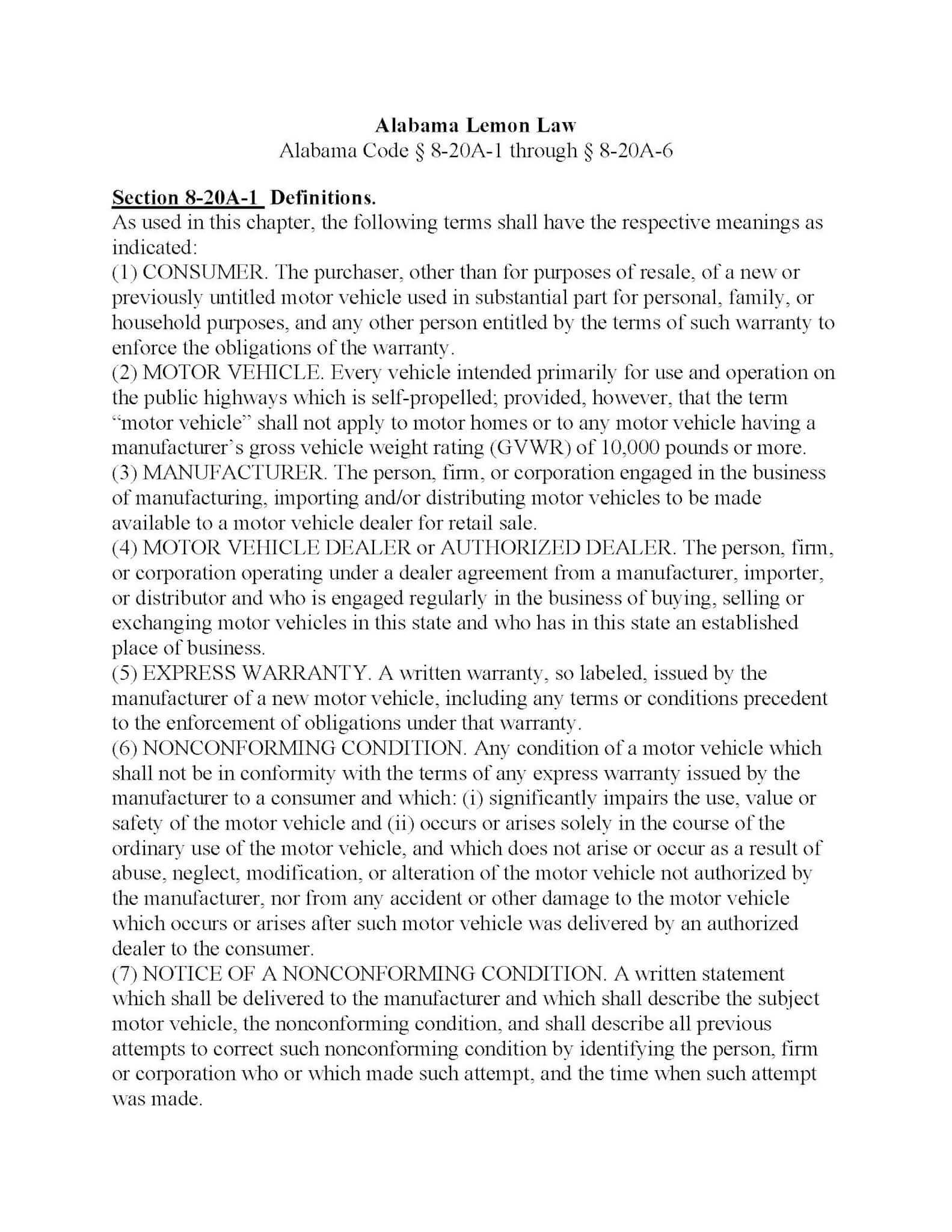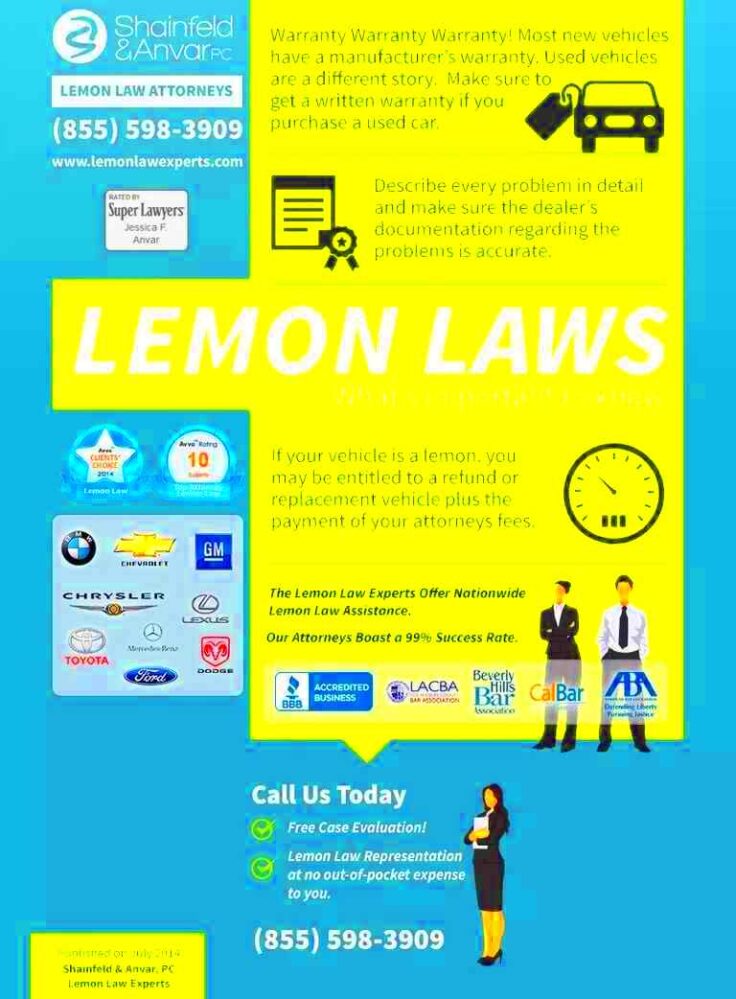Key Aspects of Alabama Lemon Laws
Alabama Lemon Laws protect consumers who buy or lease vehicles that turn out to have significant defects. These laws are designed to ensure that buyers are not stuck with a faulty car that fails to meet quality standards. If you’ve ever felt frustrated with a vehicle that just won’t cooperate, understanding these laws can be a game changer. In this article, we’ll explore what constitutes a lemon vehicle, the criteria for making a claim, and how you can seek remedies under these laws.
Definition of a Lemon Vehicle

A lemon vehicle is typically defined as a car, truck, or motorcycle that has a substantial defect affecting its use, value, or safety. In Alabama, the following criteria generally apply:
- Serious Defect: The vehicle must have a defect that significantly impairs its functionality.
- Timeframe: The defect must occur within the warranty period, usually within the first 12 months or 12,000 miles.
- Attempts to Repair: The manufacturer or dealer must have been given a reasonable number of attempts to fix the issue—typically defined as at least three repair attempts for the same problem.
- Unsafe Condition: The defect poses a serious safety risk or is considered unfit for driving.
Criteria for Lemon Law Claims in Alabama

To successfully file a lemon law claim in Alabama, you need to meet specific criteria. Here are the main points to consider:
- Warranty Coverage: Ensure that your vehicle is still covered under the original warranty.
- Significant Defect: The defect must substantially impair the vehicle’s use, safety, or value.
- Repair Attempts: You must have allowed the dealer or manufacturer a reasonable number of attempts to fix the issue.
- Notification: You should notify the manufacturer in writing about the defect if they have failed to resolve it.
If all these criteria are met, you may have a valid lemon law claim. It’s always a good idea to document your repair attempts and maintain records of communications with the dealer or manufacturer.
Steps to Take if You Have a Lemon Vehicle

If you suspect that your vehicle is a lemon, it’s essential to take specific steps to protect your rights. Here’s a straightforward guide to help you navigate the process:
- Document Everything: Keep detailed records of all repairs, including dates, descriptions of the problems, and receipts. This documentation will be crucial for your case.
- Communicate with the Dealer: Contact the dealership where you purchased the vehicle. Inform them of the persistent issues and give them a chance to fix the problem.
- Follow the Repair Process: Allow the dealer a reasonable number of attempts to repair the defect. In Alabama, this typically means three attempts for the same issue.
- Contact the Manufacturer: If the dealer is unable to resolve the issue, notify the manufacturer in writing. Include all relevant details and a copy of your repair records.
- Seek Legal Advice: If the problem persists, consider consulting with an attorney who specializes in lemon laws. They can provide valuable guidance on your rights and the best course of action.
Filing a Lemon Law Claim in Alabama
Filing a lemon law claim may seem daunting, but it doesn’t have to be. Here’s a step-by-step process:
- Prepare Your Documentation: Gather all relevant documents, including repair orders, warranty information, and any correspondence with the dealer or manufacturer.
- Determine the Appropriate Authority: You can file your claim through the Alabama Department of Consumer Affairs or pursue it in court. Research which option suits your situation best.
- Submit Your Claim: Fill out the necessary forms accurately and submit them along with your documentation. Make sure to keep copies for your records.
- Await Response: After submitting your claim, the manufacturer has a specific timeframe to respond. They may offer a resolution or request more information.
- Follow Up: If you don’t receive a timely response, don’t hesitate to follow up. Persistence can be key in these cases.
Remedies Available Under Alabama Lemon Laws
If your lemon law claim is successful, several remedies may be available to you:
| Type of Remedy | Description |
|---|---|
| Refund: | You may be entitled to a full refund of the purchase price, including taxes, fees, and other related costs. |
| Replacement: | In some cases, you can receive a replacement vehicle of comparable value and condition. |
| Repair Costs: | If you incurred costs related to repairs, you may be reimbursed for these expenses. |
It’s essential to consult with a legal expert to understand which remedy applies to your situation. Being informed about your options can help you make the best decision moving forward.
Common Misconceptions About Lemon Laws
Lemon laws can be a bit confusing, and many people have misconceptions about how they work. Let’s clear up some of the most common misunderstandings:
- Lemon Laws Only Apply to New Cars: While lemon laws primarily focus on new vehicles, they can also apply to used cars, provided they are still under warranty.
- Only Major Defects Qualify: Some people think that only serious defects qualify a vehicle as a lemon. However, any defect that affects the vehicle’s safety, value, or usability can qualify.
- Dealers Can Refuse Claims: It’s a common belief that dealerships can outright refuse lemon law claims. In reality, they are legally obligated to address valid claims and work with manufacturers.
- It’s Too Complicated to File: Many assume the process is too complex, but with the right documentation and guidance, it can be manageable. Seeking help from legal experts can simplify the process significantly.
- All Claims Are Successful: Not every claim will lead to a successful outcome. Each case is unique, and the specific circumstances will determine the result.
Frequently Asked Questions
Here are some frequently asked questions about lemon laws in Alabama:
- What is the time limit for filing a claim? Generally, you have two years from the date of purchase or lease to file a claim.
- Can I file a claim for a leased vehicle? Yes, lemon laws apply to leased vehicles as well, as long as they meet the criteria.
- What happens if my claim is denied? If your claim is denied, you may consider appealing the decision or consulting with an attorney for further options.
- Do I need an attorney to file a claim? While not required, having an attorney can help navigate the legal process and improve your chances of a successful outcome.
- Are there any costs involved in filing a claim? Filing a claim typically does not have upfront costs, but if you choose to hire an attorney, there may be legal fees.
Conclusion
Understanding Alabama lemon laws is crucial for anyone who finds themselves struggling with a faulty vehicle. By knowing the definition of a lemon vehicle, the steps to take, and the remedies available, you can advocate for your rights effectively. Don’t let misconceptions keep you from seeking the help you need. If you believe you have a lemon, gather your documentation and consider consulting with a legal expert to explore your options. Remember, you deserve a vehicle that is safe, reliable, and free from defects!


